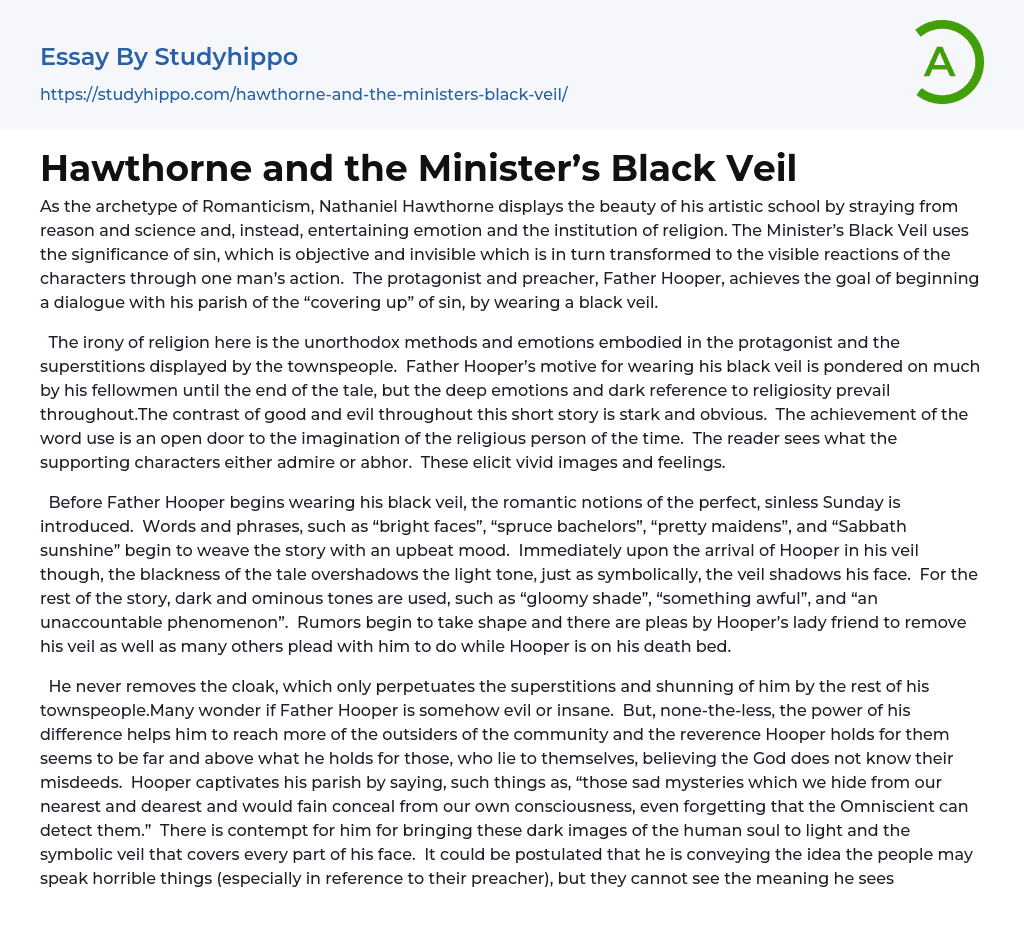As the archetype of Romanticism, Nathaniel Hawthorne displays the beauty of his artistic school by straying from reason and science and, instead, entertaining emotion and the institution of religion. The Minister’s Black Veil uses the significance of sin, which is objective and invisible which is in turn transformed to the visible reactions of the characters through one man’s action. The protagonist and preacher, Father Hooper, achieves the goal of beginning a dialogue with his parish of the “covering up” of sin, by wearing a black veil.
The irony of religion here is the unorthodox methods and emotions embodied in the protagonist and the superstitions displayed by the townspeople. Father Hooper’s motive for wearing his black veil is pondered on much by his fellowmen until the end of the tale, but the deep emotions and dark reference to religiosit
...y prevail throughout.The contrast of good and evil throughout this short story is stark and obvious. The achievement of the word use is an open door to the imagination of the religious person of the time. The reader sees what the supporting characters either admire or abhor. These elicit vivid images and feelings.
Before Father Hooper begins wearing his black veil, the romantic notions of the perfect, sinless Sunday is introduced. Words and phrases, such as “bright faces”, “spruce bachelors”, “pretty maidens”, and “Sabbath sunshine” begin to weave the story with an upbeat mood. Immediately upon the arrival of Hooper in his veil though, the blackness of the tale overshadows the light tone, just as symbolically, the veil shadows his face. For the rest of the story, dark and ominous tones are used, such as “gloomy shade”, “something
awful”, and “an unaccountable phenomenon”. Rumors begin to take shape and there are pleas by Hooper’s lady friend to remove his veil as well as many others plead with him to do while Hooper is on his death bed.
He never removes the cloak, which only perpetuates the superstitions and shunning of him by the rest of his townspeople.Many wonder if Father Hooper is somehow evil or insane. But, none-the-less, the power of his difference helps him to reach more of the outsiders of the community and the reverence Hooper holds for them seems to be far and above what he holds for those, who lie to themselves, believing the God does not know their misdeeds. Hooper captivates his parish by saying, such things as, “those sad mysteries which we hide from our nearest and dearest and would fain conceal from our own consciousness, even forgetting that the Omniscient can detect them.” There is contempt for him for bringing these dark images of the human soul to light and the symbolic veil that covers every part of his face. It could be postulated that he is conveying the idea the people may speak horrible things (especially in reference to their preacher), but they cannot see the meaning he sees and that which those refuse to see.
In conclusion, both religion and emotion are examined in The Minister’s Black Veil. Hawthorne delves into the dark and light of human feeling and brings unorthodox reason to an arguably orthodox institution. He reveals the heart of Hooper’s convictions in a final and haunting context when he states… “when the friend shows his inmost heart to his friend; the lover
to his best beloved; when man does not vainly shrink from the eye of his Creator, loathsomely treasuring up the secret of his sin; then deem me a monster, for the symbol beneath which I have lived, and die! I look around me, and, lo! on every visage a Black Veil." Therefore, the emotions and call to speculation to Hawthorne’s audience about religious life is timeless and terrifying in its medium.
- Boo Radley essays
- Genesis essays
- Richard iii essays
- Alice in Wonderland essays
- On the road essays
- Ozymandias essays
- The Nightingale essays
- Holden Caulfield essays
- Animal Farm essays
- 1984 essays
- A Hanging essays
- Shooting An Elephant essays
- A Tale Of Two Cities essays
- Adventures Of Huckleberry Finn essays
- Arthur Conan Doyle essays
- Brave New World essays
- Characters In Hamlet essays
- Characters In Romeo And Juliet essays
- Desdemona essays
- Diary Of A Wimpy Kid essays
- First-Person Narrative essays
- Frankenstein essays
- Heart Of Darkness essays
- Jane Eyre essays
- Jay Gatsby essays
- King Duncan essays
- Librarian essays
- Little Red Riding Hood essays
- Lord Of The Flies essays
- Silas Marner essays
- The Cask Of Amontillado essays
- The Catcher In The Rye essays
- The Crucible essays
- The Handmaid's Tale essays
- The Reader essays
- Virgil essays
- Wuthering Heights essays
- Candide essays
- Castle essays
- J. D. Salinger essays
- Ulysses essays
- Ethan Frome essays
- In Cold Blood essays
- Outliers essays
- Tuesdays With Morrie essays
- The Art of War essays
- Wife of Bath essays
- Huckleberry Finn essays
- The Lady With The Dog essays
- Great Expectations essays




